Eat Like Your Life Depends On It
People mean to eat well, but it's not always convenient, and it's confusing, and there are just so many excuses. As a result, lot of eating happens on autopilot, despite how impactful food is to ever aspect of our daily lives.
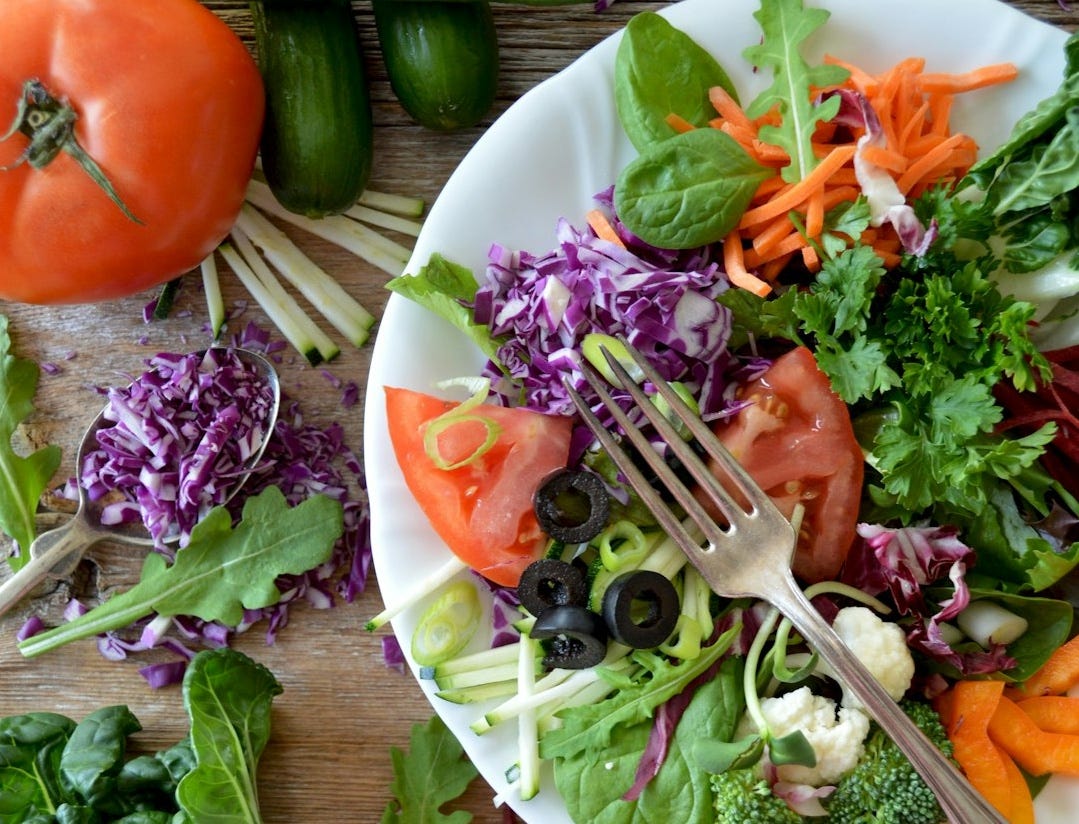
Because If We're Honest With Ourselves, It Does
How much do you think about the food you eat?
Have you mastered eating healthy to the point where it barely feels like discipline and has become "just a lifestyle"? Are you eating whatever you feel like in the moment? Do you still eat what you want in the moment if that craving is triggered by an an obnoxious fast food commercial or billboard?
Most likely you a somewhere in between.
Most people don't think about it much. Sure, they might have a few eating habits that are ingrained in their minds as being healthy, such as a daily bowl of oatmeal, eating vegetables once a day, or avoiding trans fats. People mean to eat well, but it's not always convenient, and it's confusing, and there are just so many excuses. As a result, lot of eating happens on autopilot, despite how impactful food is to ever aspect of our daily lives.
If I could give one piece of advice to every person in the world, it would be this:
Eat like your life depends on it.
Obviously I don't mean this in the same way as when someone in a horror movie says, "run like your life depends on it!" In that case, it kind of means "as much as you can without thinking or strategizing"... which, come to think of it, doesn't usually end well for the guy in the horror movie either.
Don't go all out and eat as much as you can.
Eat with strategy.
Eat like your life depends on your dietary choices because it does.
These choices have a lot more impact on our life and health than most people give them credit for. I often can't believe how absent-mindedly decisions about food are made when food is literally the building blocks of our bodies and minds. I sure hope you're giving them the right pieces!
Okay, okay. I didn't always eat healthy either!
It took a long time to learn everything I have, which is why I'm trying to make it easier for others by passing along this information.
I grew up during a time when a lot of information about food was in flux. Kraft Mac n' Cheese, Spaghetti-O's, Oreos, and Lunchables were not an uncommon occurrence in my house.
My parents were doing their best, but had no way to know how harmful these products were to longterm health. After all, Kraft bragged about all the essential vitamins and nutrients in their enriched macaroni pasta, and Spaghetti-O's had a whopping two servings of vegetables in every can! Lunchables claimed to be a healthy source of protein due to the meat and cheese, and the tiny crackers were allegedly a source of necessary whole grains.
I'm not surprised that none of us saw through this marketing. After all, we bought margarine for many years as well. We never did fall for the eggs controversy. At least I had that going for me.
My saving grace was that I grew up with a father who was a very picky eater.
He'd been picky all his life, eating a limited group of foods mainly consisting of meats and vegetables, as well as rice and potatoes. He didn't like fast food or takeout, so almost all of my meals throughout my childhood were home cooked, often starring delicious cuts of meat, and a variety of vegetables.
My mom would cook beef stew filled with chopped vegetables; chicken soup from scratch, bone-broth and all; large roasts or pans of oven-baked chicken.
One of my personal favorites to this day is a family recipe for oven-baked chicken tokened "Death Chicken" due to having the skin still on and the prevailing wisdom that eating fat would kill you.
Growing up in this environment, I largely took after my father and favored meats and simple, savory flavors. I earned the nickname "Little T-Rex" for my love all things meat.
I eventually started to try new foods, and lost my learned pickiness, but that didn't really happen until college, so despite the Spaghetti-O's I managed to keep my diet about 80% unprocessed until then.
I wonder sometimes what would be different if I had known better back then, and even avoided the few processed foods I did eat, but the internet wasn't what it is today. The "experts" were still telling us to shut up and eat the margarine.
How could I have known?
The Role Food Plays in My Adult Life
These days, I absolutely love food.
I love eating it, cooking it, and the smells and sounds of cooking it. Recently, I've begun to love photographing it, which I always thought was cheesy before, but when you blog about food and nutrition, it seems silly not to!
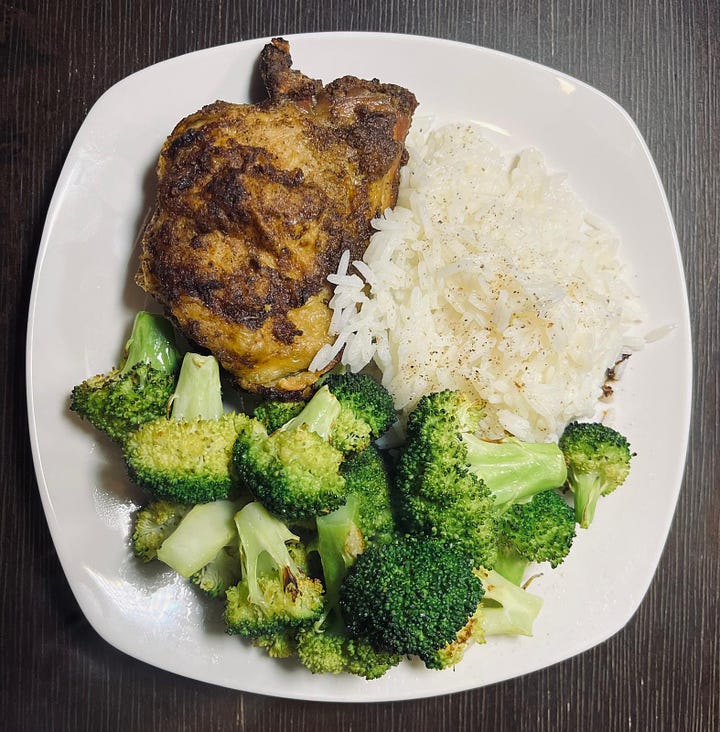
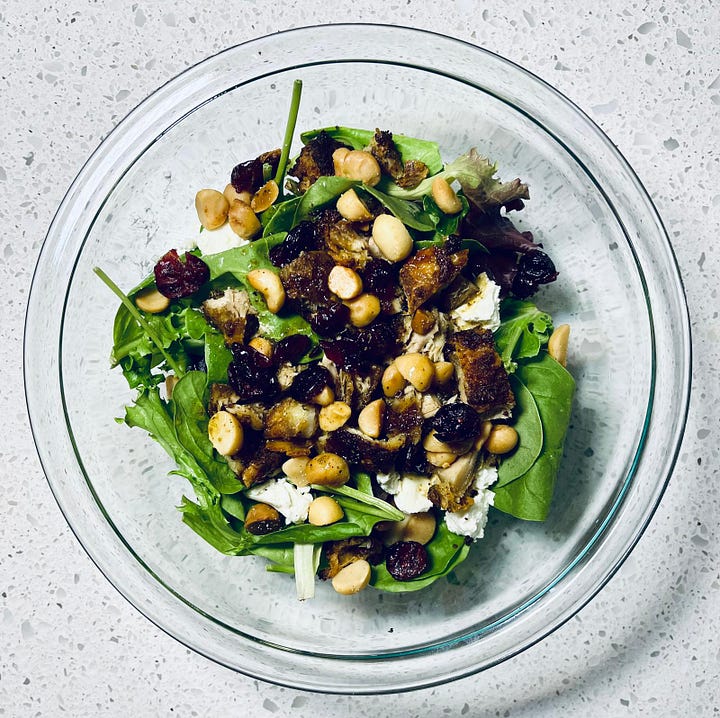
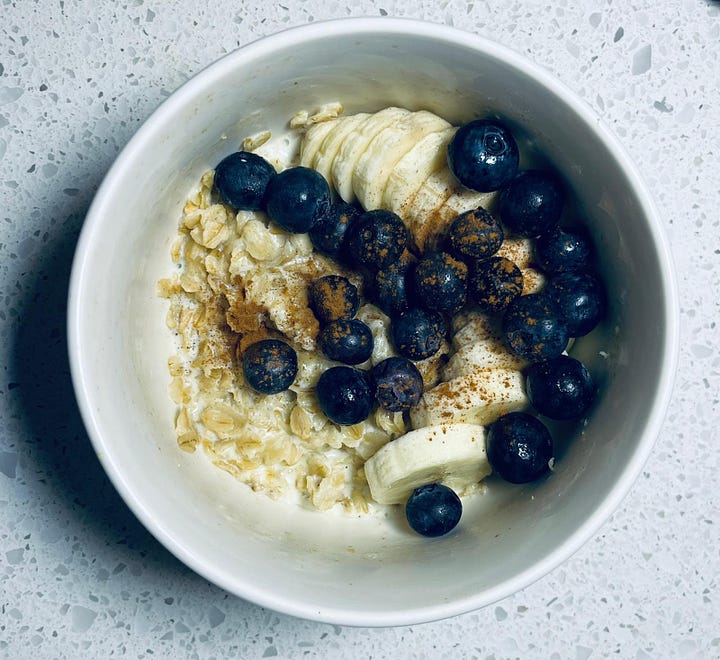
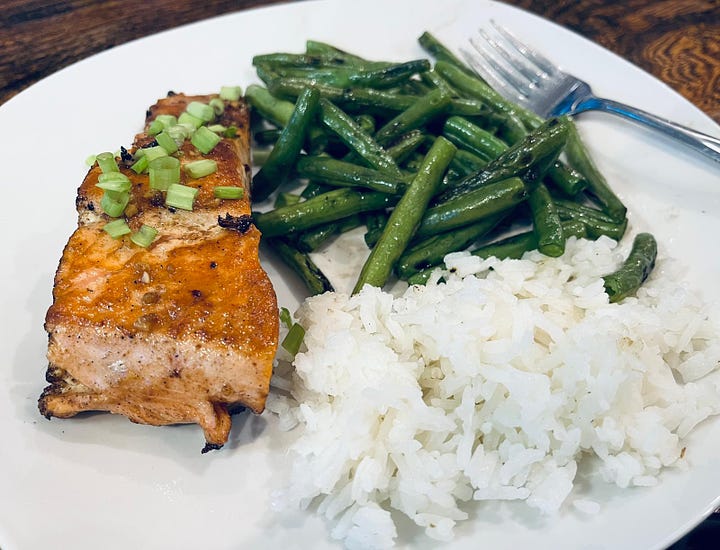
A sample of my recent food photography
Some people say they work to live, and other live to work.
I live to eat.
I'm particularly proud of my ability to improvise a meal without a recipe from the ingredients left in the fridge a day or two before our weekly grocery shop. Some of my best cooking inventions ever have been this kind of hodge-podge — fried rice, soup, or what my husband likes to call "garbage salad," which has nothing really to do with trash, I promise. It's just a normal salad topped with whatever you can find in the fridge for variety.
When I decide a meal I've never made before, I follow a recipe.
I look through 3-5 recipes for whatever I'm planning to make. I figure out what core ingredients and proportions all of them share, and what unique spin each recipe adds. Then, I make my own version, customizing based on what I've learned and my knowledge of my own taste and nutrition preferences.
There are two main changes I usually make.
- If it's a savory food and includes any kind of sugar, I leave it out. If it's a baked good and includes sugar, I reduce the sugar by at least half.
I have served food like this to many friends and family members and never once had someone request it sweeter. The amount of sugar included in most foods is absurd, and I'm convinced most recipes like that are a result of sugar lobbyists and food scientists taking advantage of the addicting effect that sugar has by causing people to crave their product.
Even supposedly savory foods like tomato sauce often sneak in as much as 8g of sugar per serving. Foods that are admittedly sweet, such as yogurt cups and granola bars can easily have 3-4x that!
I could rant about hidden sugar for days. Let’s get back to the two ways I modify recipes.
- I find ways to increase the vegetable and fiber content of the meal if it doesn't already have enough.
This comes into play most often when it comes to things like soups, stews, and casseroles. For example, a lasagna might ask for no vegetables besides the tomato sauce, resulting in a meal that's mostly carbs with a tiny bit of protein from whatever meat is thrown in. But it's easy to add a few handfuls of spinach between each later and/or stir sautéed zucchini into the meat sauce.
Also, I add a criminal amount of cheese to a lasagna. This serves the dual purpose of being delicious and also further increasing the protein and fat content to offset the carbs from the noodles and the any sugar if we're cutting corners and using jarred tomato sauce.
Seriously, please don't report me to the authorities about that cheese thing.
To top that off, you can eat your lasagna with a side salad to give a final boost to the fiber:carb ratio, but that's not technically part of the recipe.
I hope that you share my love of food. After all, flavor, texture, and smell can be pretty persuasive, but you may still be wondering, why go healthy? Isn't the healthy food the stuff that doesn't taste good -- the brussel spouts, the oat bran, the beets?
Healthy Food is Just Better
If I'm honest, I did have a period of my life when I craved a lot of unhealthy foods. I had grown up on occasional servings processed junk as I mentioned earlier, and my taste for those things didn't go away fully until a few years ago.
I still have unopened cans of Spaghetti-O's in my pantry, which I haven't decided if I will throw out or try to spice up with extra vegetables to make them passable. I hate throwing away food.
These days, I focus not just on delicious food, but on nutritious food.
I have experienced how much of a transformation can happen in focus, energy, and mood by transitioning to whole foods. Through one-month or 75-day challenges, I've dabbled with Keto, AIP, low-carb, low-FODMAP, and Mediterranean diets. I've also tried restricting or eliminating grains, added-sugar, dairy, soy, nuts, nightshades, alcohol, and seed oils.
Not all of these are necessary, but I did them on a trial basis, and I'm glad I did.
When you are eating healthy, you sleep better. You have more energy throughout the day. You don't feel sudden dips in energy in the afternoon, or wake up hungry in the middle of the night. What used to be sudden and uncontrollable food cravings become inclinations towards what you might want to eat at your next meal, subtle and manageable.
Finally, While I acknowledge that tastes can vary drastically, I truly believe that healthy food tastes better -- when our tastebuds haven't been hijacked by clever food engineers at Kellogg and Kraft, that is. Quitting highly processed foods for a period of time allows your taste preferences to return to normal and your hormones to regulate so that you begin to taste foods as they were meant to be.
Mushrooms have a rich sense of umami, deep and earthy. A well-grilled piece of salmon is almost buttery, while the crisp edges have just the right amount of crunch. A salad is an explosion of flavors of all kinds and can be accented by the subtle tanginess of feta, or the toasted crunch of sliced almonds. Or for a different direction, you can top your salad with the salty, savory delight of crumbled bacon and slices of fresh, farmer's market avocado. A bed of lettuce is basically a blank canvas.
My favorite part of every morning is my first sip of freshly brewed coffee blended with grass-fed butter. Where I used to believe my favorite drink was a Starbucks Caramel Frappuccino, now I just want butter and coffee, blended to frothy, creamy perfection. Without all the artificial flavors and sweeteners, I taste the layers of complexity in the coffee itself so much more deeply. It's actually worth it to me now to buy local, fresh roasted coffee beans and grind them daily.
I know that not everyone delights in food as much as I do, and honestly that's a shame. There could stand to be more joy in the world, and just imagine if every meal of every day was an opportunity to celebrate?
How Do You Know If You're Eating the Right Thing?
Some principles of nutrition are true for everyone, while others are based on allergies, food sensitivities, the current state of your microbiome, or individual health factors and risks. That's why nutritional recommendations are currently trending towards personalized nutrition over generic recommendations.
Still, there are some Principles that hold true for almost everyone:
- Limit Processed Foods - Avoid them altogether if you can, as they are likely the cause of most chronic illnesses in modern-day society. If you must have processed food, go for less-processed - a burger or tacos instead of a Twinkie, or limit it to one-or-two meals a week. But it's better to cut it out entirely because the chemicals in processed foods will impact your brain, causing you to crave them more and making every other change harder.
- Vary your diet - Nutrients vary greatly between different ingredients, so it's helpful to get a blend of different foods to cover your bases. Include vegetables of many colors, meats and fish, eggs, dairy, and fruits. To be frank, grains are not a required food group for any nutritional molecules. The main reasons to eat grains are that they are cheap, filling and, taste good. However, most people overdo it. Grains should be used in combination with fats, fiber, and protein, not alone, which brings us to the next point.
- Know your macros - Depending on your goals for muscle and weight loss, know what macros make sense for you, and try to be aware of their proportion in your meals. It might be helpful to use a macro tracker, like Carb Manager, to understand what macros look like in various foods, if you have not done it before.
- Pair off-menu food with activity - If you know you will be eating excessively on a certain day due to a special occasion or will not be in control of what you eat due to travel, try to counteract that meal with some activity. This also applies to working out or even going for a walk after a meal with moderate carbs in order to flatten the impending blood sugar spike.
- Eat enough protein - This last one is especially important as we age. By age 40, we are losing 1% of our skeletal muscle every year to aging, and that number doubles by the time we hit our 60s, and is up to 3% by the time we hit 70. To combat this loss, it's important to eat a minimum of 1g protein per kg of body weight. Most people miss this by a lot, especially if they portion too many of their daily calories to carbs instead of protein.
The best way for you to know what works for you is through experimentation or measurement. You may want to try an elimination diet to see what's bothering you, such as AIP or low-FODMAP. For food sensitivities like these, you can reduce sensitivities over time, making it possible to reintroduce the foods later that once triggered you. This can be a long process though -- involving repeatedly retesting foods over months or years, so at the offset you may only want to commit to the initial elimination and testing period in order to identify your sensitivities.
If you have the means, measurement using a CGM can help you understand how your body tolerates excess carbs and glucose, and can help you start to recognize the physical signs that you're going through blood glucose fluctuations.
Ever felt "hangry"? That's "hungry" and "angry" for the few people who haven't heard it, and it's often a result of a sudden decrease in blood glucose following a spike.
You can read more about my decision to try out a CGM, as well as how to access one in my last blog entry, Measure Your Wellness.
Final Thoughts
If you're looking to make changes to your diet for health reasons, you can start with these 5 principles. Think of the changes you are making as a new lifestyle, rather than as a diet. If you change your diet temporarily with the intent to lose weight or get healthier, you can only expect your results to last temporarily as well.
Consider trying out an elimination diet or CGM to further personalize your changes. You likely eat multiple times per day, so it's the first line intervention to improve your health and allow you to thrive in all areas of life.
In fact, I have a theory that we could solve the majority of medical, mental, and societal problems by changing our diets, especially the Standard American Diet (SAD). Time will tell, but I am seeing more nutritionist and doctors pushing back against the "sick-care" system that waits until a condition is bad enough to merit prescribing a pill, rather than recommending lifestyle changes to address the underlying cause.
People claim that Americans are lazy and don't want to change their diet or be more active. I say give us a chance. We spend billions on gyms, dietitians, and weight loss programs already. I think it's clear that the people want the opportunity to be better, if only they knew how.




